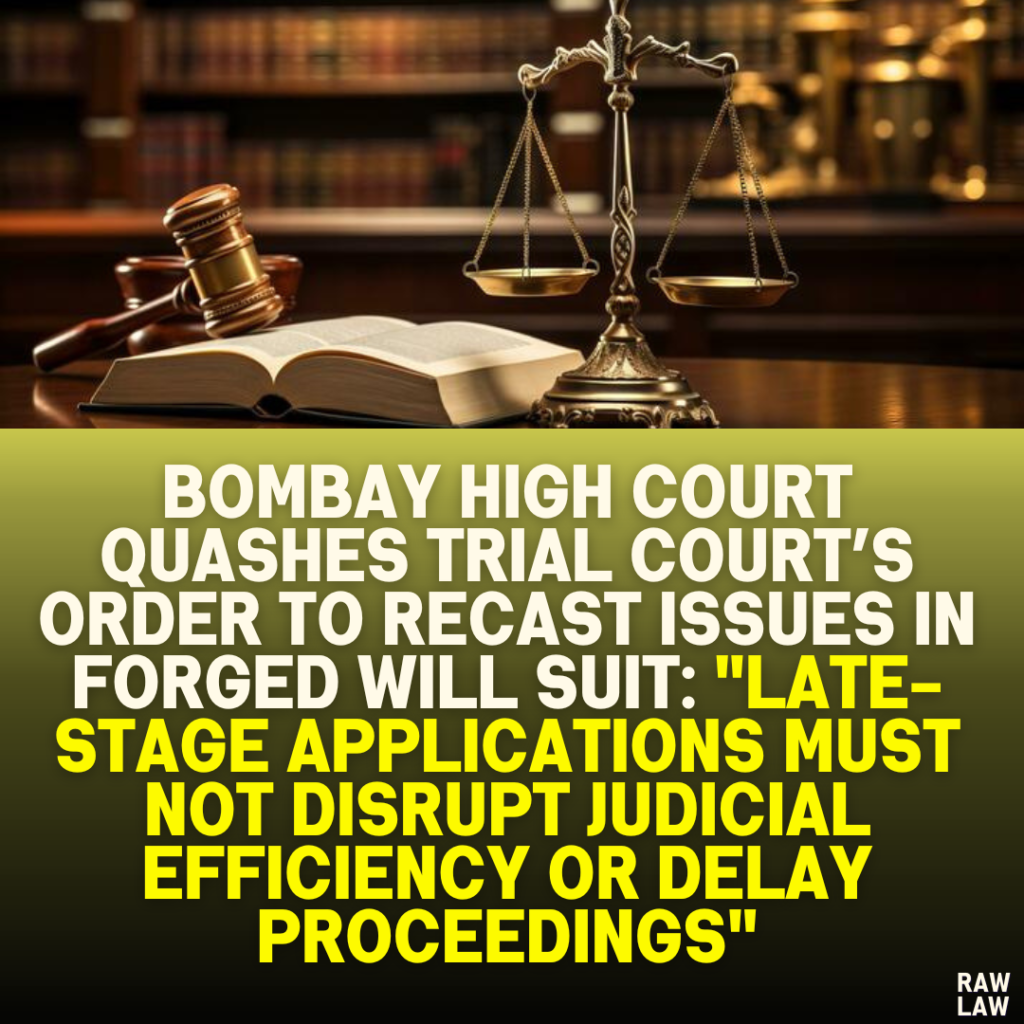Court’s Decision
The High Court of Bombay quashed the trial court’s order allowing the plaintiff’s application to recast issues and frame an additional issue in a suit involving allegations of a forged will. The High Court held that the application was unnecessary and amounted to an afterthought, especially since the trial was part-heard, and the plaintiff had already completed evidence and cross-examination. The court directed the trial court to dispose of the pending suit within one year while keeping all contentions open.
Facts
- The plaintiff filed a special civil suit in 2007 seeking:
- A declaration that the will dated February 9, 2004, executed by Mr. Gayaram Piraji Dagade in favor of one of the defendants was forged and fraudulent.
- Partition of certain properties.
- A perpetual injunction.
- Key Timeline:
- 2010: Issues were initially framed in the suit.
- 2011: An additional issue was framed regarding whether the suit was barred by law.
- 2022: The plaintiff completed cross-examination in December.
- November 2022: The plaintiff filed an application under Order XIV Rule 5 of the Civil Procedure Code (CPC) to recast the issues and add a new issue:
- Whether the will was proper, legal, without influence, and beyond suspicion.
- The trial court allowed this application on the ground that framing an additional issue was “in the interest of justice.”
Issues
- Whether the application to recast issues and frame an additional issue was warranted after the plaintiff’s evidence and cross-examination were completed.
- Whether the will dated February 9, 2004, was fraudulent or legally valid.
Petitioner’s Arguments (Defendants)
The petitioners argued that:
- The plaintiff’s application to recast issues was unwarranted and filed as an afterthought to improve their case after completing evidence.
- The principal issue about the validity of the will was already framed in 2010. Additional issues were redundant and unnecessary.
- Allowing such an application disrupted the trial process and delayed proceedings unnecessarily.
Respondent’s Arguments (Plaintiff)
The plaintiff contended that:
- Framing an additional issue was essential to determine whether the will was valid, legal, and free from suspicious circumstances.
- The interest of justice required a comprehensive examination of the case, which justified the application to recast issues.
Analysis of the Law
- Order XIV Rule 5 of CPC: Provides courts the discretion to frame or amend issues at any stage of the proceedings if it is necessary for determining the real questions in controversy.
- Indian Succession Act, 1925 (Section 63): Prescribes conditions for proving a will, including the removal of any suspicious circumstances surrounding its execution.
The High Court analyzed whether invoking Order XIV Rule 5 at a late stage of the trial was appropriate. The court emphasized that procedural rules should not be misused to bolster substantive claims once a case has advanced substantially.
Precedent Analysis
The court examined judgments cited by the plaintiff:
- Smt. Indu Bala Bose v. Manindra Chandra Bose: Discussed proving a will beyond suspicion.
- Rajkumar v. Surinder Pal Sharma: Highlighted requirements under the Succession Act for proving a will.
- Shonali Kedar Dighe v. Ashita Tha: Dealt with circumstances surrounding testamentary proceedings.
Distinction: The court noted that these cases dealt with testamentary proceedings, whereas the present case involved a declaratory suit challenging the validity of a will. Thus, the precedents were not directly applicable.
Court’s Reasoning
- Unnecessary Recasting of Issues:
- The plaintiff had already presented evidence and completed cross-examination.
- The principal issue about the validity of the will was already framed in 2010. Framing an additional issue at this stage was redundant.
- Allowing such an application would cause unnecessary delay and disrupt the trial.
- Afterthought Application:
- The court observed that the plaintiff’s application was filed after analyzing their own evidence post-cross-examination.
- This was deemed an attempt to improve their case rather than addressing any procedural or substantive necessity.
- Distinction from Cited Cases:
- Unlike the testamentary cases cited, this was a declaratory suit. The plaintiff’s burden to prove the forgery of the will was already encapsulated in the existing issues.
- Impact on Trial:
- Filing such applications at an advanced stage of the trial undermines judicial efficiency and creates procedural delays.
Conclusion
The High Court quashed the trial court’s order allowing the application to recast issues. It directed the trial court to dispose of the pending suit within one year. The court explicitly kept all contentions open for both parties.
Implications
- Judicial Efficiency: The judgment reinforces the principle that applications to amend or recast issues must not disrupt the trial’s progress.
- Strict Procedural Adherence: Courts should prevent misuse of procedural provisions to bolster cases post-evidence.
- Burden of Proof: In declaratory suits challenging wills, plaintiffs must substantiate their claims within the framework of pre-framed issues.
This decision underscores the balance courts must maintain between ensuring justice and preventing procedural misuse.




Pingback: Jammu & Kashmir and Ladakh High Court Upholds Recall of Suit Withdrawal Order: Settlement Breach, Misrepresentation, and Recurring Cause of Action Critical in Property Disputes - Raw Law